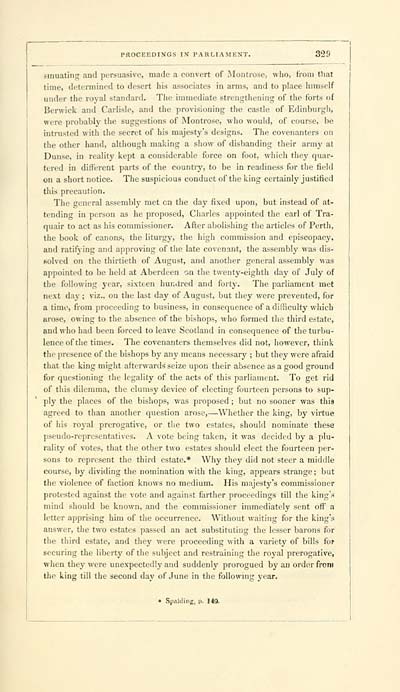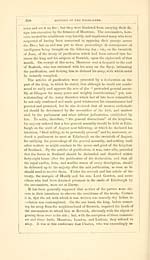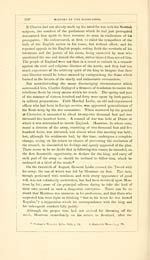Download files
Complete book:
Individual page:
Thumbnail gallery: Grid view | List view

PROCEEDINGS IN PARLIAMENT.
329
sinuatiiig and persuasive, made a convert of Montrose, who, from that
time, determined to desert his associates in arms, and to place hnnself
under the roval standard. The immediate strengthening of the forts of
Berwick and Carlisle, and the provisioning the caslle of Edinburgh,
were probably the suggestions of Montrose, who would, of course, be
intrusted with the secret of his majesty's designs. The covenanters on
the other hand, although making a show of disbanding their army at
Dunse, in reality kept a considerable force on foot, which they quar-
tered in difterent parts of the country, to be in readiness for the field
on a short notice. The suspicious conduct of the king certainly justified
this precaution.
The general assemblj' met en tlie day fixed upon, but instead of at-
tending in person as he proposed, Charles appointed the earl of Tra-
quair to act as his commissioner. After aljolisliing the articles of Perth,
the book of canons, the liturgy, the high commission and episcopacy,
and ratifying and approving of the late co^■enant, the assembly was dis-
Bolved on the thirtieth of August, and another general assembly was
appointed to be held at Aberdeen on the twenty-eighth day of July of
the following year, sixteen hundred and forty. The parliament met
next day ; viz., on the last day of August, but they were prevented, for
a time, from proceeding to business, in consequence of a difficulty which
arose, owing to the absence of the bishops, who formed the third estate,
and who had been forced to leave Scotland in consequence of the turbu-
lence of the times. The covenanters themselves did not, however, tliink
the presence of the bishops by any means necessary ; but they were afraid
that the king might afterwards seize upon their absence as a good ground
for questioning the legality of the acts of this parliament. To get rid
of this dilemma, the clumsy device of electing fourteen persons to sup-
ply the places of the bishops, was proposed ; but no sooner was this
agreed to than another question arose, — Whether the king, by virtue
of his ro3'al prerogative, or the two estates, should nominate these
pseudo-representatives. A vote being taken, it was decided by a plu-
rality of votes, that the other two estates should elect the fourteen ])er-
sons to represent the third estate.* Why they did not steer a middle
course, by dividing the nomination with the king, appears strange; but
the violence of faction knows no medium. His majesty's commissioner
protested against the vote and against farther proceedings till the king's
mind should be known, and the commissioner immediately sent off a
letter apprising him of the occurrence. Without waiting for the king's
answer, the two estates passed an act substituting the lesser barons for
the third estate, and they were proceeding with a variety of bills for
securing the liberty of the subject and restraining the royal prerogative,
when they were unexpectedly and suddenly prorogued by an order from
the king till the second day of June in the following year.
Spalding, p. 149.
329
sinuatiiig and persuasive, made a convert of Montrose, who, from that
time, determined to desert his associates in arms, and to place hnnself
under the roval standard. The immediate strengthening of the forts of
Berwick and Carlisle, and the provisioning the caslle of Edinburgh,
were probably the suggestions of Montrose, who would, of course, be
intrusted with the secret of his majesty's designs. The covenanters on
the other hand, although making a show of disbanding their army at
Dunse, in reality kept a considerable force on foot, which they quar-
tered in difterent parts of the country, to be in readiness for the field
on a short notice. The suspicious conduct of the king certainly justified
this precaution.
The general assemblj' met en tlie day fixed upon, but instead of at-
tending in person as he proposed, Charles appointed the earl of Tra-
quair to act as his commissioner. After aljolisliing the articles of Perth,
the book of canons, the liturgy, the high commission and episcopacy,
and ratifying and approving of the late co^■enant, the assembly was dis-
Bolved on the thirtieth of August, and another general assembly was
appointed to be held at Aberdeen on the twenty-eighth day of July of
the following year, sixteen hundred and forty. The parliament met
next day ; viz., on the last day of August, but they were prevented, for
a time, from proceeding to business, in consequence of a difficulty which
arose, owing to the absence of the bishops, who formed the third estate,
and who had been forced to leave Scotland in consequence of the turbu-
lence of the times. The covenanters themselves did not, however, tliink
the presence of the bishops by any means necessary ; but they were afraid
that the king might afterwards seize upon their absence as a good ground
for questioning the legality of the acts of this parliament. To get rid
of this dilemma, the clumsy device of electing fourteen persons to sup-
ply the places of the bishops, was proposed ; but no sooner was this
agreed to than another question arose, — Whether the king, by virtue
of his ro3'al prerogative, or the two estates, should nominate these
pseudo-representatives. A vote being taken, it was decided by a plu-
rality of votes, that the other two estates should elect the fourteen ])er-
sons to represent the third estate.* Why they did not steer a middle
course, by dividing the nomination with the king, appears strange; but
the violence of faction knows no medium. His majesty's commissioner
protested against the vote and against farther proceedings till the king's
mind should be known, and the commissioner immediately sent off a
letter apprising him of the occurrence. Without waiting for the king's
answer, the two estates passed an act substituting the lesser barons for
the third estate, and they were proceeding with a variety of bills for
securing the liberty of the subject and restraining the royal prerogative,
when they were unexpectedly and suddenly prorogued by an order from
the king till the second day of June in the following year.
Spalding, p. 149.
Set display mode to: Large image | Transcription
Images and transcriptions on this page, including medium image downloads, may be used under the Creative Commons Attribution 4.0 International Licence unless otherwise stated. ![]()
| Early Gaelic Book Collections > Ossian Collection > History of the Highlands and of the Highland clans > Volume 1 > (443) |
|---|
| Permanent URL | https://digital.nls.uk/79677913 |
|---|
| Description | Vol. I. |
|---|---|
| Shelfmark | Oss.247 |
| Additional NLS resources: | |
| Attribution and copyright: |
|
| Description | Selected books from the Ossian Collection of 327 volumes, originally assembled by J. Norman Methven of Perth. Different editions and translations of James MacPherson's epic poem 'Ossian', some with a map of the 'Kingdom of Connor'. Also secondary material relating to Ossianic poetry and the Ossian controversy. |
|---|
| Description | Selected items from five 'Special and Named Printed Collections'. Includes books in Gaelic and other Celtic languages, works about the Gaels, their languages, literature, culture and history. |
|---|

